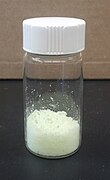3,5-Di-tert-butylsalicylaldehyde
Appearance
(Redirected from 3,5-di-tert-butyl-2-hydroxybenzaldehyde)
| |||
| Names | |||
|---|---|---|---|
| Preferred IUPAC name
3,5-Di-tert-butyl-2-hydroxybenzaldehyde | |||
| Identifiers | |||
3D model (JSmol)
|
|||
| ChEMBL | |||
| ChemSpider | |||
| ECHA InfoCard | 100.157.837 | ||
PubChem CID
|
|||
| UNII | |||
CompTox Dashboard (EPA)
|
|||
| |||
| |||
| Properties | |||
| C15H22O2 | |||
| Molar mass | 234.339 g·mol−1 | ||
Except where otherwise noted, data are given for materials in their standard state (at 25 °C [77 °F], 100 kPa).
| |||
3,5'-Di-tert-butylsalicylaldehyde is an organic compound. It is a pale yellow solid. This aldehyde is a building block for preparing salen ligands.
Preparation
[edit]This compound is commercially available. It may be prepared by the Duff reaction, from 2,4-di-tert-butylphenol and hexamethylenetetramine:[1]
Reactions
[edit]Condensation of this aldehyde with various diamines gives various salen ligands, which are popular for catalysis. For example, the enantiopure ligand for Jacobsen's catalyst may be prepared from the appropriate 1,2-diaminocyclohexane. The catalyst is obtained by further reaction with manganese(II) acetate and atmospheric oxygen in the presence of a chloride source.[1]
References
[edit]- ^ a b Jay F. Larrow and Eric N. Jacobsen (2004). "(R,R)-N,N'-Bis(3,5-Di-tert-Butylsalicylidene)-1,2-Cyclohexanediamino Manganese(III) Chloride, A Highly Enantioselective Epoxidation Catalyst". Organic Syntheses; Collected Volumes, vol. 10, p. 96.




